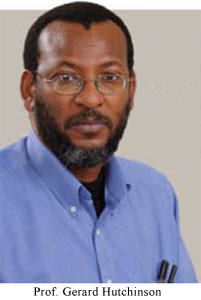15-20% of population had or has mental issues

The head of the psychiatry department of the University of the West Indies estimates that between 15 and 20 per cent of the population either has had or has a mental health problem that requires intervention.
Prof Gerard Hutchinson revealed this while speaking to the media on Thursday, at a Ministry of Health sensitisation seminar. It was held in collaboration with the World Health Organisation Assessment Instrument for Mental Health Systems (WHO-AIMS) TT 2020 at the Radisson Hotel, Port of Spain.
Hutchinson said the implementation of WHO-AIMS would be able generate information on strengths and weaknesses to facilitate improvement in mental health services.
"The goal of collecting this information is to improve the mental health system and to provide a baseline for monitoring the change. One of the things I would like to see achieved with this study is for the identification of most, if not all mental homes in TT.
"Sometimes elderly homes in TT offer multiple services to the population."
Hutchinson said what took place at an Arouca rehabilitation centre must not happen again.
In October, 69 people were found at the Transformation Life Ministry in what were said to be inhumane conditions, some in cages and with handcuffs.
Hutchinson said, “Upgrades are being undertaken at the Arouca rehabilitation centre, but it has to be seen in the larger context of how shall such homes be regulated, monitored and supervised in terms of the provision of the kind of services the homes provide.
“At this stage it is a work in progress, but certainly the development and the application of standards that have been agreed on internationally – attempts are being made to ensure homes in TT adhere to most of the standards."
Ashvini Nath, manager of the Mental Health Unit of the Ministry of Health and regional health authorities, said the government is reforming the national model of care for mental health.
Nath said there is a lot of research internationally that supports a decentralised model of care.
She said the ministry is working on decentralising mental services because there are a number of benefits of having services available to people in communities.
“It reduces the stigma, increases the access to care, it increases social integration."
She said the centralisation of mental health care facilities was "one of the challenges currently facing the public health sector.”
The study, which had previously been done in 2007, should provide information on the strengths and weaknesses of the mental health system, she said, "so that we know where the gaps are and where our efforts should be directed.”
Nath said WHO-AIMS will provide crucial information as the ministry seeks to develop a new model of behavioural health and wellness care. During this assessment, essential information would be collected, compiled, analysed and ultimately used to improve behavioural health and wellness systems in the public health sector.
“We are working on a number of different projects, to formalise them in March 2020."
Nath said according to the WHO-AIMS report of 2007, St Ann’s Hospital remains the centre of mental health services and absorbs approximately 85 per cent of the ministry’s expenditure allocated for mental health.


Comments
"15-20% of population had or has mental issues"